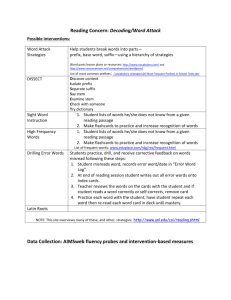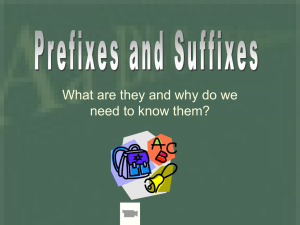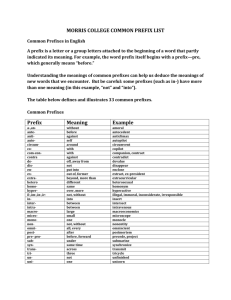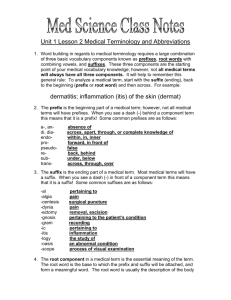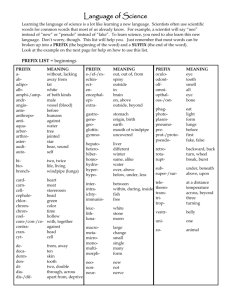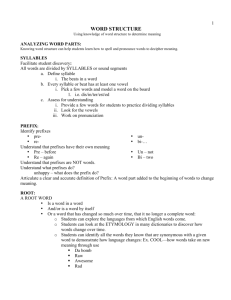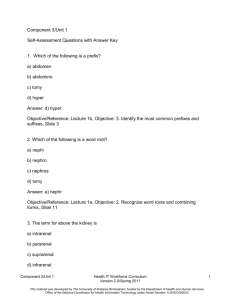Science Prefixes & Suffixes Worksheet | Middle School Biology
advertisement
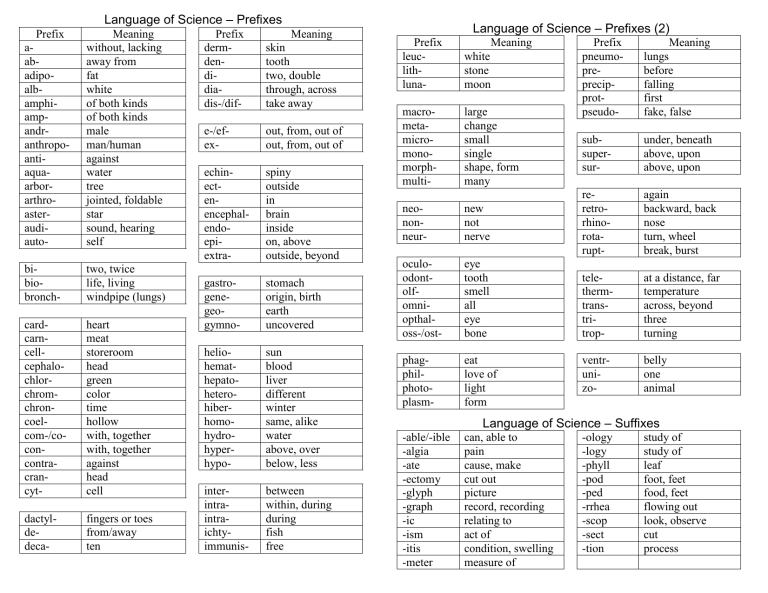
Language of Science – Prefixes Prefix aabadipoalbamphiampandranthropoantiaquaarborarthroasteraudiauto- Meaning without, lacking away from fat white of both kinds of both kinds male man/human against water tree jointed, foldable star sound, hearing self bibiobronch- two, twice life, living windpipe (lungs) cardcarncellcephalochlorchromchroncoelcom-/coconcontracrancyt- heart meat storeroom head green color time hollow with, together with, together against head cell dactyldedeca- fingers or toes from/away ten Prefix dermdendidiadis-/dif- Meaning skin tooth two, double through, across take away e-/efex- out, from, out of out, from, out of echinectenencephalendoepiextra- spiny outside in brain inside on, above outside, beyond gastrogenegeogymno- stomach origin, birth earth uncovered heliohemathepatoheterohiberhomohydrohyperhypo- sun blood liver different winter same, alike water above, over below, less interintraintraichtyimmunis- between within, during during fish free Language of Science – Prefixes (2) Prefix leuclithluna- Meaning white stone moon macrometamicromonomorphmulti- large change small single shape, form many neononneur- new not nerve oculoodontolfomniopthaloss-/ost- eye tooth smell all eye bone phagphilphotoplasm- eat love of light form -able/-ible -algia -ate -ectomy -glyph -graph -ic -ism -itis -meter can, able to pain cause, make cut out picture record, recording relating to act of condition, swelling measure of Prefix pneumopreprecipprotpseudo- Meaning lungs before falling first fake, false subsupersur- under, beneath above, upon above, upon reretrorhinorotarupt- again backward, back nose turn, wheel break, burst telethermtranstritrop- at a distance, far temperature across, beyond three turning ventrunizo- belly one animal Language of Science – Suffixes -ology -logy -phyll -pod -ped -rrhea -scop -sect -tion study of study of leaf foot, feet food, feet flowing out look, observe cut process Name __________________________________ period ____ Language of Science 6 Learning the language of science is a lot like learning a new language. Scientists often use scientific words for common words that most of us already know. For example, a scientist will say “neo” instead of “new” or “pseudo” instead of “fake”. To learn science, you need to also learn this new language. Don’t worry, though. This list will help you. Just remember that most words can be broken up into a PREFIX (the beginning of the word) and a SUFFIX (the end of the word). Example of how to use the list Word: TELESCOPE Step 1. Look up the first part of the word under the PREFIX LIST tele = at a distance Step 2. Look for the rest of the word under the SUFFIX LIST scope = look or observe So, the whole word means “distance-look” or to look at something at a distance. Note The order of the words may not always seem right; don’t worry about that. Sometimes you can only find one part of a word but that can be a good clue about the meaning You may have extra letters like o or a or i between two parts of a word— they don’t mean anything If you don’t see a word in the suffix list, check the prefix list. Sometimes, words can be both a prefix and a suffix. Notice that several prefixes can mean the same thing: 1. What are two prefixes that mean ONE or SINGLE? __________ __________ 2. What are two suffixes that mean CUT or CUT OUT? __________ __________ 3. What are two prefixes that mean ABOVE or ON? __________ __________ 4. What are two prefixes that mean TWO? __________ __________ Just knowing one part of a word gives you a clue to the whole word 5. Would you want to be careful when touching an animal called an ECHINDNA? Yes No Why? _______________________________________ 6. What does a CARNIVORE eat? _______________ 7. Is a NEONATE a tiny baby or an old person? ____________________ 8. Is a CRANIOTOMY a serious surgery? Yes No Why? ________________ 9. An ALBINO rabbit is what color? _______________ 10. Does an AMPHIBIAN live on land or water? _______________ 11. If a medicine is CONTRAINDICATED for you, should you take it? Yes No 12. A DERMATOLOGIST works with what part of the body? _______________ 13. How does a tiny animal called a ROTIFER travel through the water? ________________________ (hint: look up rota) 14. If you visited the Memorial Park ARBORETUM, what would you expect to see? _______________ 15. In 1969, where did the LUNAR mission land? _______________ 16. What is another name for a CHRONOMETER? _______________ 17. Why do they call this symbol (*) an ASTERISK? ________________________ 18. What part of your body would be sick if you had BRONCHITIS? ________ 19. What is the doctor talking about when she says LEUCOCYTES? __________ 20. The scientific name for a squid is a CEPHALOPOD. What does it mean? ___________________________
